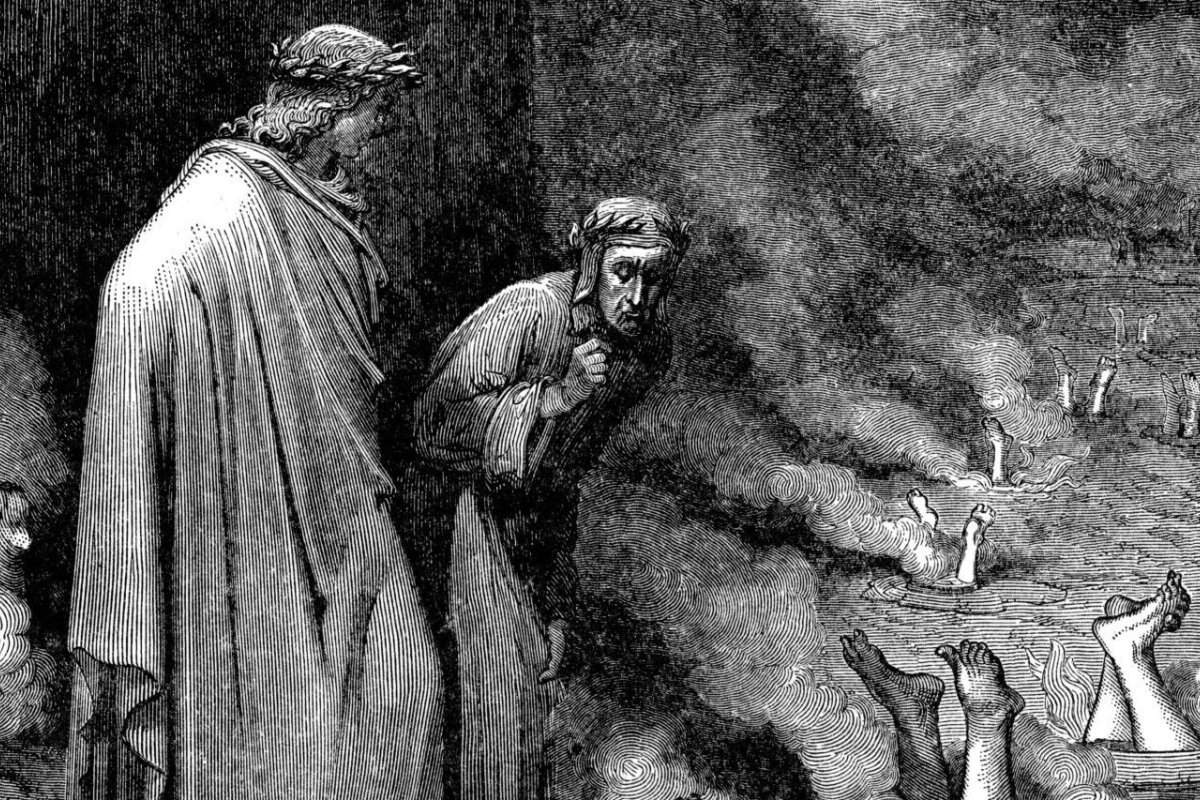
The Road to Hell: Dantes Inferno and the Undermining of Trust
A late-medieval view of institutional sin
It’s easy to imagine how the dismal hellscape in Dante’s Inferno could be relevant in the year 2020. The jokes practically write themselves. Dante’s poem even predicted murder hornets.
Beyond the obvious, though, Inferno speaks to two features of American public life: the decline in trust in institutions and authorities, and the phenomenon of the “post-truth society.”
Dante believes in the value of institutions and in the intrinsic goodness of a properly ordered society. In Dante’s view, those in positions of authority have been given that authority by God. This does not mean leaders can do whatever they like; rather, they must fulfill their appointed duties with seriousness and selflessness. Dante, like Uncle Ben, believed that with great power comes great responsibility; or as the New Testament puts it, “From everyone to whom much has been given, much will be required; and from the one to whom much has been entrusted, even more will be demanded.”
For Dante, anyone who subverts, corrupts, or discredits the institutions that support society is doing something gravely wicked. The lowest circle of hell is reserved for those who betray that which is most important, which includes community, family, and good leadership.
Readers of Inferno are struck by how many kings, political leaders, and popes are in it. This is in part because this poem is work of political satire, and in part because Dante wants to illustrate the different forms these sins take by using examples his contemporaries would be familiar with. But a deeper reason is because of Dante’s belief in the importance of social institutions fulfilling their duties to God and to the people. Because Dante placed such value on the institutional structures and social norms of his day, he leveled a witheringly critical gaze at those who abused their position, defamed the institutions they were supposed to represent, and exploited the trust and dependence of others. Dante is not anticlerical; it is precisely because people depend on the church that it is such a travesty when church officials are undependable.
This helps us understand why Dante places fraudulent advisors, people who sell political offices for money, reporters who lie, and hypocritical priests all in the eighth circle of hell, punished more harshly than murderers and war criminals. This may seem counter-intuitive to modern ears, but it suggests an all-too-relevant assessment of the ways evil operates within a society.
One lesson to take from Inferno is that many of the truly evil acts are not the kind that make headlines. Evil thrives when people in positions of authority abuse their privileges and neglect their responsibilities in ways that may seem unremarkable.
Our attention tends to gravitate toward acute instances of wrongdoing, discrete actions we can point to and say, “that action is clearly wrong,” like armed robbery. We are not wrong to condemn these actions or to want to prevent them, but we should keep in mind that a lot of unnecessary suffering is caused not by acute instances of wrongdoing, but more unremarkable patterns of action. Little actions—judges showing favoritism, policemen over-patrolling minority neighborhoods, bishops promoting their nephews over more qualified people, politicians stretching the truth to get votes, moneylenders exploiting the poor—chip away at the pillars that keep society upright, making it harder for people to meet their basic needs, discern the truth, and rely on one another.
The road to hell, for Dante, is not paved with good intentions, so much as with little compromises that add up and ripple out into widespread suspicion, frustration, and deprivation.
Take, for example, a medical doctor who posts a video expressing an opinion at odds with scientific consensus without sufficient evidence. This is not good, we all recognize, but it doesn’t seem as acute or exceptional as someone mugging a stranger. The doctor may indeed receive a lot of shares and favorable comments. And yet, this video not only misleads the people who trust it, but also makes it harder for the people trying to report actual facts to be believed. Or, consider a politician who bends to the will of donors rather than doing what is best for their constituents. It may not seem exceptional—it may seem like business as usual—but it reinforces a system in which people cannot rely on their representatives and those with money can get away with anything. These actions are not as dramatic as the mugging, but they do more devastating long-term damage.
Many of the punishments in Dante’s Inferno are crafted to show readers that sins they might not see as especially bad actually do a great deal of harm. Dante thus anticipated the ideas of Hannah Arendt about the banality of evil. Our attention and condemnation tend to gravitate toward acute wrongdoing because it leaps off the page. We can easily become numb to the small actions and patterns of behavior that, when aggregated, pollute our society. The vivid imagery of Dante’s Inferno represents forms of corruption that may have been normalized in a way that helps us recognize their true colors. Like the portrait of Dorian Gray, the book reveals the decay that runs through Dante’s society—and through our own.
Image: Gustave Doré, "Dante Addresses Pope Nicholas III," 1890 (illustration of canto XIX).
Sightings is edited by Daniel Owings, a PhD Candidate in Theology at the Divinity School. Sign up here to receive Sightings via email. The views and opinions expressed in this article are those of the author and do not necessarily reflect the position of the Marty Center or its editor.


